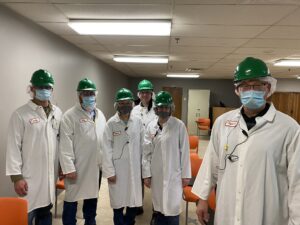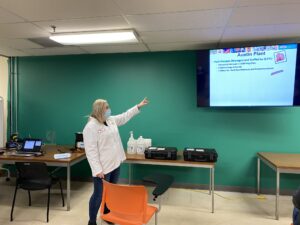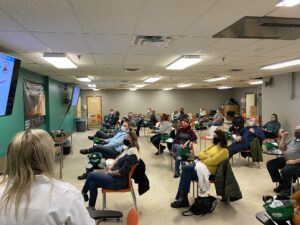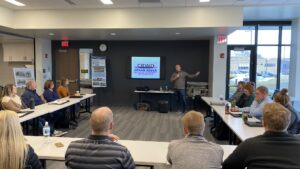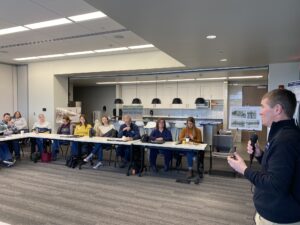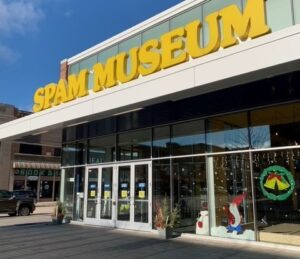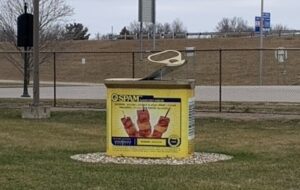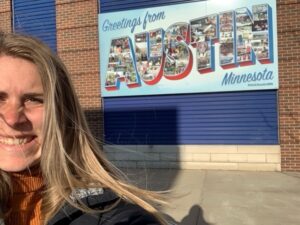A seminar in December…I think we all anticipated potential weather issues like maybe a snow storm or freezing temps but I don’t think any of us expected record temps reaching 64 degrees and severe thunderstorms and tornadoes! Leave it to the crazy Minnesota weather to toss us another curve ball. Regardless of the circumstances that continue to be thrown at Class XI we maintain our flexibility and never let anything get in the way of representing MARL, learning and most importantly enjoying our time together as a class.
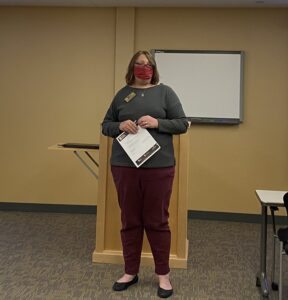
Extension Educator Christy Kallevig introducing the seminar.
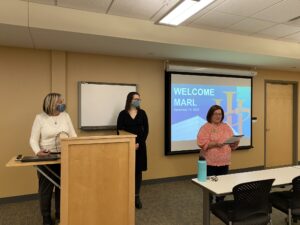
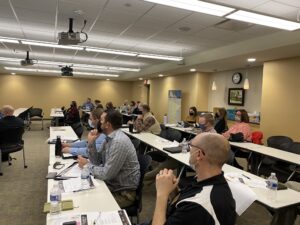
Day one began at the Hormel Institute we kicked off the seminar with initial discussions regarding the upcoming fundraiser. Following the discussion, we were joined by Gail Dennison, Director of Development and External Relations and Brenna Gerhart, Development Associate. They shared with us an overview of the Hormel Institute, the history that spans nearly eight-decades and the incredible work Institute is doing with their accelerated discoveries aimed at beating cancer and improving the health of the world. It was clear they are truly passionate for their work and the work of the entire institute. Their efforts in raising funding, coordinating annual events and so many educational outreach efforts are all truly remarkable.
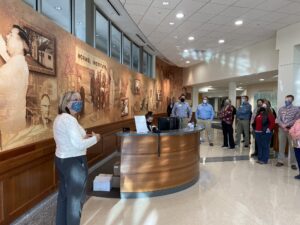
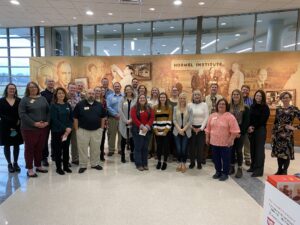 Following the presentation, we had the opportunity to tour their facility. The building had multiple expansions one in 2008 and one in 2016 that created additional opportunities to continue their work on advancing research and providing education that benefits not only the Austin community but the surrounding regions and the entire State of Minnesota. A highlight of the tour was the Kryo EM Lab which is the first in the Midwest. This state-of-the-art microscope allows for scientists to study the form and function of specimens and see how they are built and what they do in much greater details than ever before. This facility houses some of the world’s most cutting-edge technologies and expert scientists.
Following the presentation, we had the opportunity to tour their facility. The building had multiple expansions one in 2008 and one in 2016 that created additional opportunities to continue their work on advancing research and providing education that benefits not only the Austin community but the surrounding regions and the entire State of Minnesota. A highlight of the tour was the Kryo EM Lab which is the first in the Midwest. This state-of-the-art microscope allows for scientists to study the form and function of specimens and see how they are built and what they do in much greater details than ever before. This facility houses some of the world’s most cutting-edge technologies and expert scientists.
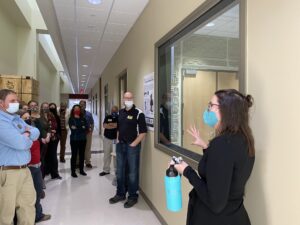
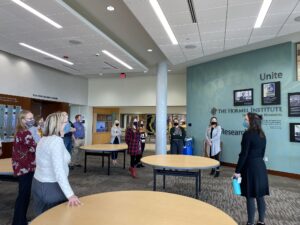
Next, the class split up into groups and embarked on an adventure to explore the innovation taking place within Austin in one of three visits.
- Austin Welcome Center
- This group met with Varinh Van Vugt a program director for the Welcome Center. The Welcome Center is a small organization run by four women which began in 2000. The vision of the Welcome Center is empowering diverse community engagement through guidance and connections. They offer a number of services that help build the highly diverse community of Austin from employment, medical, social and educational services. They are also leading the way with some incredible and innovative events for example their biggest event called “Taste of the Nations” is free to the community and an opportunity to celebrate Austin and learn about the different nations represented in the community. The event helps raise awareness through dance, music and cuisine. The small but mighty organization is doing a significant amount of work spanning across the entire community and truly impacting the lives of so many people.
- Hormel Foundation
After spending time with the Hormel Foundation we found that it was the desire of George and Jay Hormel that the company headquarters remain in Austin. One way they insured this was by making the foundation the majority partner of Hormel foods. The foundation receives all of its funding from dividends paid by Hormel foods. They’re then able to redistribute those to projects within the Austin area. When the foundation was set up there was a clause that the money needed to stay in the Austin area. They are also set up to be a supporting organization so they can only donate to other organizations. They have a list of 15 that are approved by the board. 335 million have been donated through the foundation since it’s beginning in 1941. With 300 million of that being since 2000. The donations have a wide variety of impact on the community from helping with a new community center to cleaning up the river as well as scholarships for high school students to attend the local community college. It amazed me that a Fortune 500 company is in Minnesota and set up in such a way that so much money is going back into the local community. especially when we look at the foundation funding all of the operating expenses for the Hormel institute so any money that comes into the institute goes directly to research. I felt that through the Hormel Foundation you’re really seeing how a 130-year-old company can be so mature and humble by making large donations without claiming all of the credit. I felt that they enjoyed being a silent partner and seeing the benefit that it had in the community.
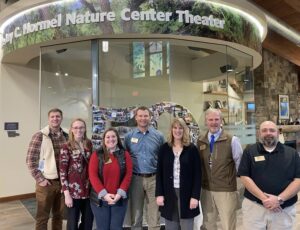
Hormel Foundation report submitted by Elizabeth Golombiecki
- Riverland Community College – Center for Agricultural and Food Science Technology
- “Something New is Growing Here at Riverland”, Nick Schiltz the Agricultural Instructor & Program Coordinator at Riverland Community College (RCC) in Austin, MN passionately proclaimed. Nick began with some interesting statistics; 2 out of every 100 people have a family link to agriculture, 45% of all jobs are linked to the Ag & Food industry and 10% of the workforce are farmers. Interesting to learn that so few people are producing the food, fiber and fuel for everyone. Nick is an all-star promoter of agriculture and thrives on helping students of all backgrounds explore the opportunities in agriculture. As Nick was sharing stories of students that discover they have a passion for agriculture, to watching some of his students in the Ag program that have never been on a farm feed animals, bed pens, or ride in a tractor for the first time and suddenly for that student all the classroom farm terminology has practical comprehension. It is easy to see how Nick’s high level of enthusiasm for teaching agriculture is sustainable.
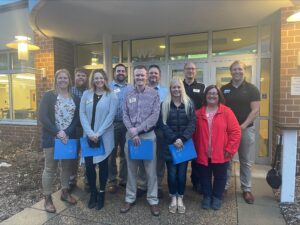 Nick, RCC and the community of Austin have developed and built an excellent Ag program, Ag community culture and a bright future for those entering Agricultural related professions. RCC offers three Certificate options- Agribusiness, Precision Ag and Farm Business Management which by the way is RCC second largest program. An Associate of Arts (AA) degree in Agricultural Sciences Concentration and an Associate of Science (AS) degree in Agricultural Sciences are available. Both degrees transfer seamlessly to U of MN, SDSU, SMSU and UWRF or into the workforce as well as the certificate programs. There are also a multitude of non-traditional educational options. Whatever the students end goal is, the faculty at RCC is available to provide guidance to help the student achieve their end goals.Nick invests in the youth of the Austin community through two programs. The first program is STEM Comes Alive Boot Camp for students entering grades 9-12. A one week free, fun and fast moving boot camp that makes science, technology, engineering and math (STEM) come alive through an agricultural lens. Second is a 10 month R-STEP Academy for students aged 16-22 (entering 11th grade) that increases STEM knowledge and skills through an 8 credit college level courses like Math, English with topics in Tech, Engineering, Ag, and the Environment. Applied research learning and enrichment, STEM-
Nick, RCC and the community of Austin have developed and built an excellent Ag program, Ag community culture and a bright future for those entering Agricultural related professions. RCC offers three Certificate options- Agribusiness, Precision Ag and Farm Business Management which by the way is RCC second largest program. An Associate of Arts (AA) degree in Agricultural Sciences Concentration and an Associate of Science (AS) degree in Agricultural Sciences are available. Both degrees transfer seamlessly to U of MN, SDSU, SMSU and UWRF or into the workforce as well as the certificate programs. There are also a multitude of non-traditional educational options. Whatever the students end goal is, the faculty at RCC is available to provide guidance to help the student achieve their end goals.Nick invests in the youth of the Austin community through two programs. The first program is STEM Comes Alive Boot Camp for students entering grades 9-12. A one week free, fun and fast moving boot camp that makes science, technology, engineering and math (STEM) come alive through an agricultural lens. Second is a 10 month R-STEP Academy for students aged 16-22 (entering 11th grade) that increases STEM knowledge and skills through an 8 credit college level courses like Math, English with topics in Tech, Engineering, Ag, and the Environment. Applied research learning and enrichment, STEM-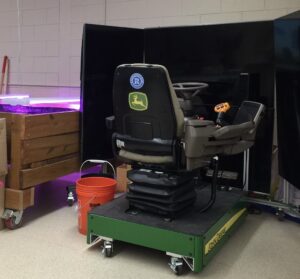
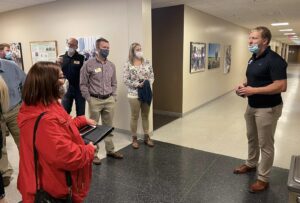 based activities and events, special guest speakers, and field trips are apart of this academy.
based activities and events, special guest speakers, and field trips are apart of this academy.
- Riverland Community College has many partners that help make RCC an excellent place to receive an agricultural education. Answer Acre Research Farm, Local Ag industry Companies and Cooperatives, and local farmers are all working together to ensure classroom content has practical applications in the workforce. RCC offers an affordable and relevant education while building a solid foundation whether going onto a University or entering the workforce.Riverland Community College report by Deborah Mills
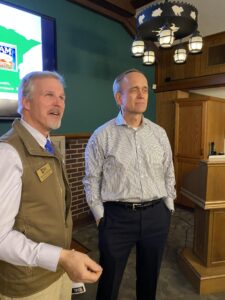
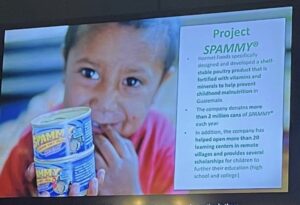
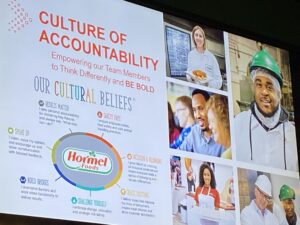
To conclude the evening, we had the privilege to gather at the Hormel Sales Cabin and exclusive opportunity for us to reflect on innovation and the experiences of the day. Jeff Grev, Vice President of Legislative Affairs joined us for a presentation on Hormel before dinner. We learned about the growth of Hormel with their new facilities as well as the diversification of their brands. Hormel fosters a culture of accountability and they truly empower their team members to think differently and be bold. Continuing with the concept of innovation they have created a 20 by 30 challenge in which they have determined goals pertaining to their products, environmental sustainability, include and diversity, education, hunger relief among many others. Hormel also created project Spammy in which they designed a shelf stable poultry product that is fortified with vitamins and minerals to help prevent childhood malnutrition in Guatemala. They donate over 2 million cans of Spammy each year…truly amazing! And what evening wouldn’t be complete without some innovative Spam appetizers. Spam sushi…coming right up! Moments after seating for dinner the severe weather set in and the class enjoyed the evening meal with the power out. Another first we can add to our ever-growing list!
Submitted by Jana Stangler

